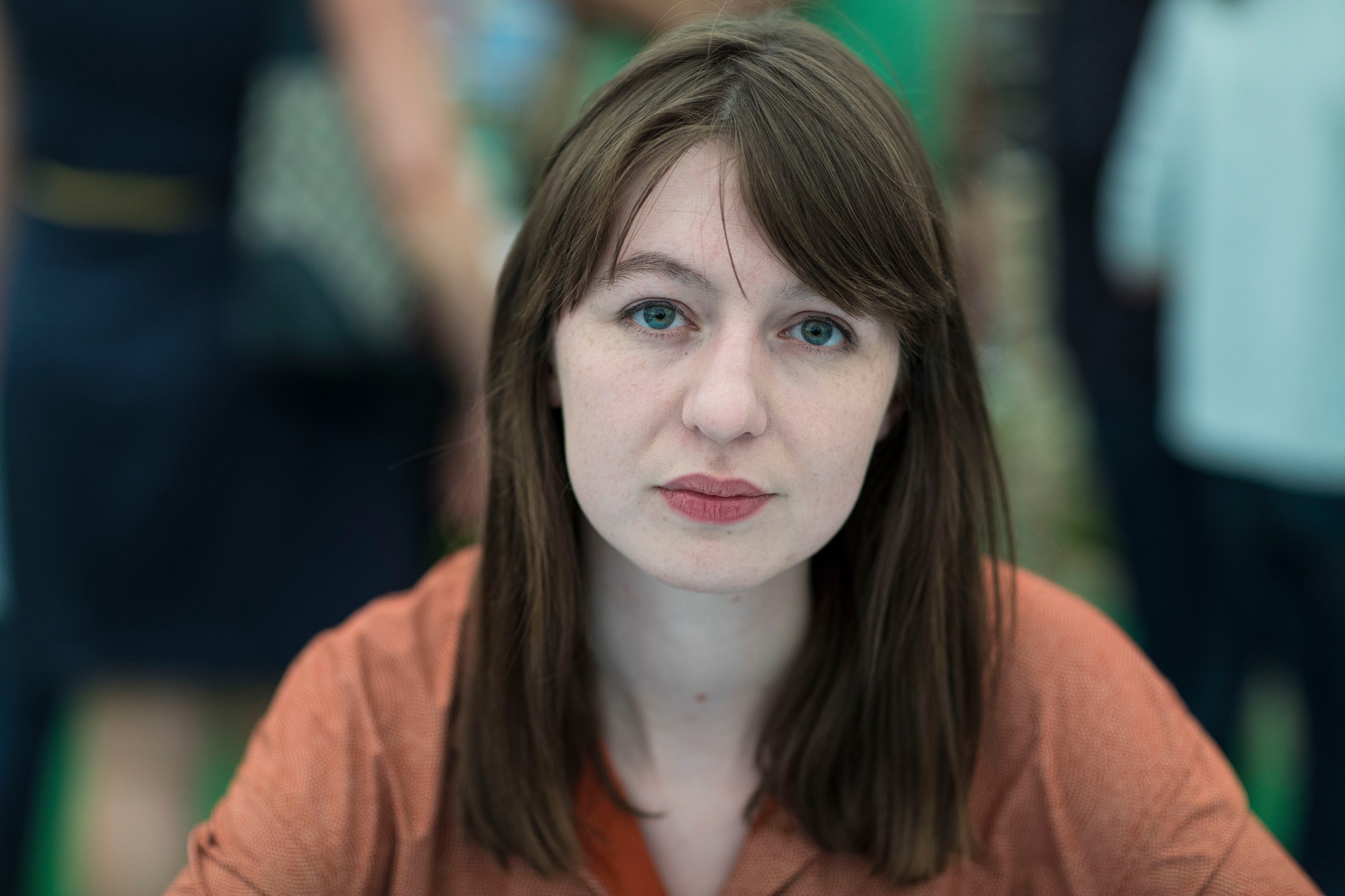There is a long history of people being weird about Sally Rooney: Her books are too Marxist or not Marxist enough; she glamorizes thinness, stigmatizes BDSM, and promotes unhealthy age-gap relations; her queer characters don’t have queer sex; worst of all, she had the arrogance to embark on career as a novelist without first having completed an MFA. But people demanding that she is pounced upon by an SAS unit and imprisoned for 14 years if she ever steps foot in Britain is, even by these prior standards, quite intense. By publishing an opinion piece in the Irish Times on Aug. 16, titled “I support Palestine Action. If this makes me a ‘supporter of terror’ under UK law, so be it,” she has become an enemy of the British state and a hero to many of its citizens, who are unable to agree with her without facing arrest. That Rooney finds herself in this position is the result of the British state’s long-standing strategy, handed down from one government to the next, of misusing terrorism laws to suppress dissent and limit the boundaries of acceptable opinion.
In July, the British government proscribed Palestine Action as a terrorist organisation, akin to ISIS or Al-Qaeda. Under British law, proscription makes it a criminal offense, carrying up to 14 years' imprisonment, not only to be a member of the group but to support it in any way. The bill was rushed through parliament after Palestine Action activists broke into a Royal Air Force base and damaged two planes, in what they said was a response to the British army’s ongoing support of Israel. By that point, the ground for proscription had already been laid by months of lobbying from the arms industry and meetings with the Israeli government.
In a move to guarantee its success, Labour Home Secretary Yvette Cooper tacked on two neo-Nazi groups to the proscription order: the Russian Imperial Movement and the Maniacs Murder Cult, a group from the country Georgia which once allegedly instructed an undercover informant in New York to dress up as Santa and distribute poisoned sweets to Jewish children and other racial minorities. MPs could vote to ban all three groups or none at all; the bill passed by a resounding margin.
Palestine Action, established in 2020, is a direct action group which seeks to disrupt the supply of weapons to Israel. Its primary target has been Elbit, an Israeli defense firm which operates several factories in Britain and produces a range of military technology, including drones components, artillery, and naval command systems. By repeatedly shutting down its sites and forcing many of the companies it works with to cut ties, Palestine Action has succeeded in costing Elbit millions of pounds.
The group’s core demand—the end of weapons sales to Israel—is one shared by the majority of the British public, as opinion polls have shown. It is also a legal obligation of the British government, which has a duty to suspend arms licenses if there is a risk of them being used to commit war crimes—a threshold which has clearly been passed in Gaza—as well as a duty to prevent to provide genocide. Citing these concerns, Foreign Secretary David Lammy suspended 30 arms export licenses to Israel in 2024, but the government is still allowing the production and exportation of components used in F-35 jets, which have been used extensively in air strikes against Palestinians, along with 300 active arms licenses. Since 2023, the British military has also flown hundreds of surveillance flights over Gaza, allowed Israeli jets to refuel at two of its army bases, and trained a number of IDF personnel. Britain continues to be not just complicit but an active participant in Israel’s genocide, as a comprehensive report from the British Palestinian Committee makes clear.
Faced with a growing chasm between public opinion and government policy, it’s no surprise that Labour is cracking down on activism for Palestine. It has no intention of changing course on its policy toward Israel, beyond a slightly sterner rhetorical stance and the vague threat of future sanctions, which leaves it little choice but to jettison domestic civil liberties just as readily as it tossed aside to international law. The alternative—imposing meaningful sanctions on Israel—is seemingly out of the question. The proscription of Palestine Action was also pushed through at a time when Prime Minister Keir Starmer is trying to appear tough on the world stage, pledging to spend billions more in defense and making a grand display of his support for NATO. It is deeply embarrassing for the government that two young activists glided through a high-security military base on electric scooters, which may also have contributed to the harshness of the response.
As of now, if you live in Britain, support Palestine Action, and don’t want to get charged with a terrorism offence, you have two choices: Pretend you experienced a dramatic epiphany just as the clock struck midnight on July 5 and realized that nothing, not even genocide, excuses damaging the property of an Israeli arms firm, or choose your words very carefully. It’s been quite surreal to receive texts from friends asking questions like, Do you think I can get away with sharing this photo of an elderly woman being arrested at a protest and describing her as “brave”? The law is so ambiguous that these questions can rarely be answered with any certainty, and different lawyers will often tell you different things.
You are categorically not allowed to say you support Palestine Action, which is clear enough. But while you are allowed to decry the group’s proscription or endorse its aims, such as calling for an arms embargo, in practice either could veer into what might be construed as an expression of support. You can defend the principle of direct action, but defending specific tactics might get you into trouble: It’s not clear whether “I don’t support Palestine Action, but in principle I think it’s fair and just to commit property damage to disrupt a genocide” amounts to a supportive statement. Anything nudge-nudge-wink-wink should be treated with extreme caution, and it’s harder than you might imagine to subvert the ban with sarcasm, irony or a judiciously chosen emoji. “Your honor, I was being charmingly coy” is unlikely to cut it in a court of law. The ambiguity is the point, of course, and many will be self-censoring legal speech or avoiding the topic altogether.
Thankfully, there are a lot of brave, principled people in Britain who haven’t been cowed by the legislation. There have been at least 700 arrests for defying the ban since it came into effect, with the majority taking place on a single day at a demonstration in London last Saturday. Most of the people involved sat in silence and held placards which read “I oppose genocide. I support Palestine Action." Others have been arrested for wearing a T-shirt bearing the slogan “Plasticine Action” and a stop motion character from a 1970s children’s show, or for displaying a satirical cartoon printed in the magazine Private Eye, and holding a sign which read, “If you're looking at Palestine and think there should be no action, you're on the wrong side of the genocide.” In the most flagrant overreach yet, a woman in Kent was threatened with arrest simply for displaying posters which read “Free Gaza” and “End the genocide,” on the basis that this constituted an expression of support for a proscribed group. A police officer was filmed telling her, “Mentioning freedom of Gaza, Israel, genocide—all of that all come under proscribed groups, which are terror groups that have been dictated by the government.” This isn’t true, but it was troubling enough to see the eagerness of the police to interpret the law in the most heavy-handed way possible.
At a demonstration on Aug.16, the arrestees included priests, vicars, dozens of pensioners—including one woman in her nineties—and a blind man in a wheelchair. Images of these hardened terrorists being dragged off by the police for engaging in the most peaceful protest imaginable have come to define the ban, leading many commentators across the political spectrum to conclude that the government has overreached.
This is the climate in which Rooney published her op-ed in the Irish Times. A rhetorical provocation, Rooney’s essay effectively goaded the British state into taking action against her:
My books, at least for now, are still published in Britain, and are widely available in bookshops and even supermarkets. In recent years the UK’s state broadcaster has also televised two fine adaptations of my novels, and therefore regularly pays me residual fees. I want to be clear that I intend to use these proceeds of my work, as well as my public platform generally, to go on supporting Palestine Action and direct action against genocide in whatever way I can. If the British state considers this “terrorism”, then perhaps it should investigate the shady organisations that continue to promote my work and fund my activities, such as WH Smith and the BBC.
Rooney has so far managed to evade capture by British counter-terrorism police, not least because she lives in a different country, but a lot of people are determined to make this happen. The government hasn’t commented on the article specifically, beyond issuing a blanket reminder that is against the law to fund terrorism, but a number of organisations have not only taken the bait but bragged about having done so. The eagle-eyed detectives over at Campaign Against Antisemitism, an avowedly pro-Israel, group tweeted “We have reported Sally Rooney to @TerrorismPolice,” an outcome which had presumably occurred to her when she publicly announced her intention to break Britain’s terrorism laws.
Unsurprisingly, Rooney’s intervention has been met with intense condemnation, which has mostly been limited to the right, since the ban is opposed by the vast majority of Labour members, and even the soppiest centrists aren’t crazy about it. The attack on Rooney is made up of two approaches. The first, led by pundits and columnists, is to belittle and demean her. The Telegraph’s Zoe Strimpel insults her physical appearance, describes her prose as “self-regarding” and quotes a lengthy, elegantly written passage from the Irish Times article before adding, in quite a jarring mismatch of rhetorical skill: “What a smug cow.” Douglas Murray, writing in the Spectator, attributes Rooney’s pro-Palestine stance to what he views as a uniquely Irish pathology: "The desire to be the first victim, perhaps the greatest victim, of all victims, anywhere in the world.” In Spiked, Brendan O'Neill derides Rooney for writing “naff novels” and “chic lit for people with PhDs,” then implies her suggestion she may face legal consequences for her stance is a kind of self-flattering, persecutory fantasy. Many of these broadsides are scoffing rather than outraged in tone—as if to say, Let’s just ignore this silly little tantrum—but this is undermined by the efforts of the right elsewhere, as pro-Israel groups call on the BBC to remove adaptations of her novels from its streaming platforms and for her publisher, Faber & Faber, to drop her. This response could scarcely be a better way of illustrating Rooney’s argument that the ban represents “an alarming curtailment of free speech.”
And then there is the demand that Rooney be arrested on sight if she ever steps foot on British soil. While the British state has taken draconian steps recently, I still find it hard to imagine it would apprehend one of the world’s most famous authors for writing an article. Then again, before the proscription came into effect, I was skeptical it would have the stomach to arrest elderly women or retired vicars under the same law, and it has shown no qualms about doing that at mass scale.
There’s no doubt that Rooney has expressed support for Palestine Action, and the police would have the power and jurisdiction to arrest her in Britain for this alone, but according to Shahd Hammouri, a lecturer in international law and legal theory at the University of Kent, it would be far more difficult to prove the more serious charge of funding a proscribed group. While Rooney pledged to do exactly that, Palestine Action doesn’t officially exist anymore, having disbanded after the ban. There will continue to be direct action—a new protest group, calling itself “Yvette Cooper,” targeted an arms firm in July—but it’s not like there’s a Palestine Action bank account or PayPal link. It’s unclear at this stage what funding them would mean in practice.
“In theory, declaring her intention [to fund Palestine Action] could lead her to being arrested, but it would be very difficult to establish the material element of the crime,” Hammouri said. If Rooney were to donate to the legal fees of the group’s individual members or to the campaign against its proscription, this would be entirely legal. As she has yet to be convicted of any crime, there is also no legal obligation for the organizations she works with to sever ties, however much they are “warned” to do so by pro-Israeli groups and former government advisors. It’s unlikely we’ll soon see an adaptation of Intermezzo on the BBC, which has bent over backward to appease pro-Israel groups since the genocide began, but it would be truly shocking if Faber & Faber dropped its biggest author, a move which could incur not only a substantial loss of future profit but the likelihood of a mass boycott. People like Sally Rooney more than they like Israel.
Rooney will probably find it easy enough to avoid being arrested by the British government, although it doesn’t say anything reassuring about the state of our democracy that she may effectively be barred from visiting here. This doesn’t detract from her courage, which is both meaningful and sadly rare among artists of her stature, nor does it take away from her act to acknowledge that people whose names you may not know are already facing far harsher consequences for falling afoul of Britain’s anti-terrorism laws. A group of Palestine Action activists known as the Filton 18, who broke into the factory Israeli arms company Elbit in August 2024, now face over two years’ imprisonment before having a trial or being convicted of any crime. This outrageous curtailment of their civil liberties is only made possible because they have been detained under terrorism laws, even though the incident in question took place long before Palestine Action was proscribed.
This misuse of terror laws is in some ways unprecedented—a direct action group never having been proscribed before—but it’s an escalation rather than something altogether new. The role played by Islamophobia can’t be overstated. The “Prevent” strategy, a counter-terrorism program which targets people before they have committed a crime or expressed any intention of doing so, has for years been used to suppress the Palestine solidarity movement at British universities, and to severely curtail the human rights of British Muslims, among others. Over the last few years, there has been a sharp uptick in school-aged children being reported to Prevent for wearing pro-Palestine stickers or badges, with one student facing both a referral and a police visit for tweeting “From the river to the sea, Palestine will be free.” The British state's feud with the author of Normal People might be a ridiculous new chapter, but it's also drawing more attention to what has been an absurd and unjust situation for quite a long time.






